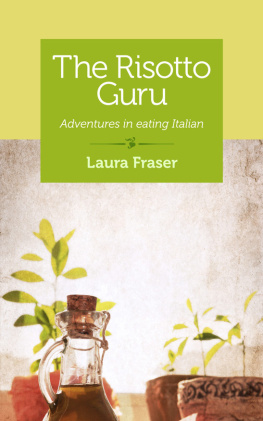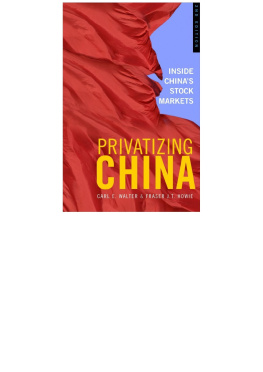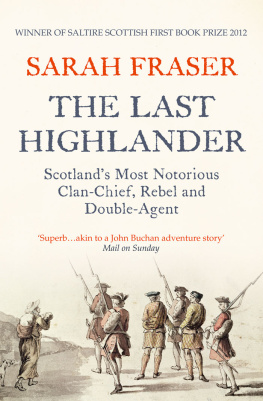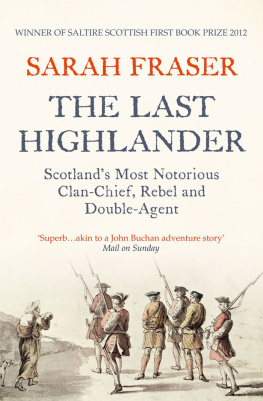From China to Peru

Russell Fraser
A MEMOIR OF TRAVEL

2009 University of South Carolina
Cloth edition published by the University of South Carolina Press, 2009
Ebook edition published in Columbia, South Carolina,
by the University of South Carolina Press, 2012
www.sc.edu/uscpress
21 20 19 18 17 16 15 14 13 12 10 9 8 7 6 5 4 3 2 1
The Library of Congress has cataloged the cloth edition as follows:
Fraser, Russell A.
From China to Peru : a memoir of travel / Russell Fraser.
p. cm.
ISBN 978-1-57003-825-9 (cloth : alk. paper)
1. Voyages and travels. 2. Fraser, Russell A.Travel. 3. Travelers writings, American. 4. ScholarsUnited StatesBiography. I. Title.
G226.F73A3 2009
910.4092dc22
2009004276
ISBN 978-1-61117-173-0 (ebook)
Let observation, with extensive view,
Survey mankind from China to Peru.
Samuel Johnson, The Vanity of
Human Wishes
CONTENTS
PREFACE
This book is personal memoir as well as an account of travel. Each chapter opens with a bit of autobiography, segueing into the travel piece that follows. What I say of myself isnt freestanding but ties one chapter to another, and the essays on travel have more than the unity of what comes next. Taken as a whole, they offer a reading of what we are like, gathered from observation of the world we live in.
In each chapter time moves between present and past. I begin in the present but return to the past, creating a multilayered account of place and history. As in my earlier book The Three Romes, I am writing nonfiction stories. Though they dont have a moral, they have an intention, describing the psychology that moves us. All the fact is true, reflecting firsthand experience, but the experience is filtered through characters, including the speaker. I watch what happens when the characters meet the experience and draw conclusions from the way they react.
The quotation I lead off with, from Dr. Johnson, suggests that observation, as wide-ranging as possible, comes first. But I havent gone around the world to count the cats in Zanzibar, and I aim to throw a little light on the places Ive traveled to, including their mysterious soul. Seeing the world up close isnt guaranteed to make the heart beat faster. So much humdrum goes with traveling that Ive wondered more than once why I ever left home. To remind me where Ive been, I take notes and keep a record of my itinerary. But a skeptical voice whispers in my ear, wanting to know if the jottings in my notebook and the lines on my map add up to a meaningful pattern. When I sit down to write, this question is before me.
Travel writers for the Sunday paper find a pattern in their daily routine: for example, I breakfasted this morning on the Boul Mich, wrote a few postcards, and took the Metro to the Luxembourg Gardens. I have a garden in my own backyard, and to justify the expense of spirit that goes into traveling, not to mention the out-of-pocket expenses, I want a pattern with more to it than that. But even the daily round has a shape beneath the surface, though detecting it isnt easy. While the frothy stuff on the surface bobs along the stream of time, things of worth sink to the bottom. Thereabouts I take up my position.
I was a lot younger when I began to travel. Things I did then are beyond me today. I no longer aspire to ski the Mont Blanc, and I use a jigger to measure my drinks. I thought it important to see the Antarcticand dont mind that its safely in the past tense. But though the face I show the world is craggier than it was, the places I write about are preserved in memory, where neither moth nor rust can get at them. In this respect the written word beats the life every time.
Many friends and acquaintance bore a part in making this book. I single out George Core, without whom nothing would have got done, and the late Staige Blackford, a model editor, always helpful, never obtrusive. Most of the pieces brought together here appeared first in the Virginia Quarterly Review under his editorship. Annie Dillard included one in her Best American Essays 1988, one comes from the Michigan Quarterly, another from the Iowa Review. My thanks to the editors of these publications. All the pieces I reprint have been revised, but I havent sought to update them. Khomeini and the cold war were still going strong when I went to the Gulf, and in my time in Peru the Shining Path terrorists were threatening to take over the country. The Saudi Arabia todays papers are full of is and isnt the one I describe. Al-Qaida hadnt yet been heard from, but the enmity between Jew and Arab was already an old story, like their enduring sameness. Instead of keeping abreast of current events, my book aims at detecting what was true yesterday and is likely to remain true tomorrow.
Though it seems to tell of a man traveling alone, in fact I had company, my wife. She was the director on top of the flies who got me going in the morning and saw to it that I was home before dark. When the two of us lived in Rome, we spent a lot of time in Piazza del Popolo, admiring the paintings in its great church. Just outside the piazza an enterprising vendor sold a line of cotton dresses, cheap but stylish, and I bought a dress for Mary, colorful with the onion domes of Moscows Red Square. That dress wore out ages ago, and I wish I could replace it with a brand-new one. Failing that, this book is for her.
1
Wadi-Bashing in Arabia Deserta
Straight out of graduate school and glad to have it behind me, I did what Horace Greeley told us to. I went west. But the flowers in California, though the biggest Id seen and gorgeous to look at, didnt smell. My teaching job at UCLA had strings attached. Id been at it only a few months when I was asked to sign a loyalty oath. Asked puts it politely, and before Christmas I found myself out of a job.
My colleagues were my friends, nice people you could count on. They cared about the environment, supported our schools, and belonged to the liberal wing of the Democratic Party. All signed the oath, except one rancorous conservative who was damned if hed do what they told him. Most of my students came from Central Casting, blond young women with ponytails and golden skin, young men who smiled easily and had sun-bleached eyes and a great backhand. In some, what you saw was what you got. The best-looking coed in the class turned out to be the smartest, though, also a friend. When I got fired she went to her accountant uncle, who worked for the ILWU, the longshoremen. Jobs on the waterfront arent easy to come by, but he wangled me a ticket, entitling me to shape up.
Every day at dawn I drove my ancient Dodge from my apartment in Venice around the coast to San Pedro, one of LAs three seaports. Standing on a chair in the hiring hall, the dispatchaccent on the first syllableshaped us up. Men with seniority got the days first assignments, posted to work warehouses alongshore. Those with know-how were dispatched to load and unload cargo in the holds of oceangoing ships. For men with a strong back, there seemed nothing to it. Appearances deceive, though, and unless cargo is stowed properly it will shift in rough seas, sometimes battering its way through the hull. At the bottom of the totem pole, I waited for my name to be called. If it wasnt I got back in the car and drove home.










